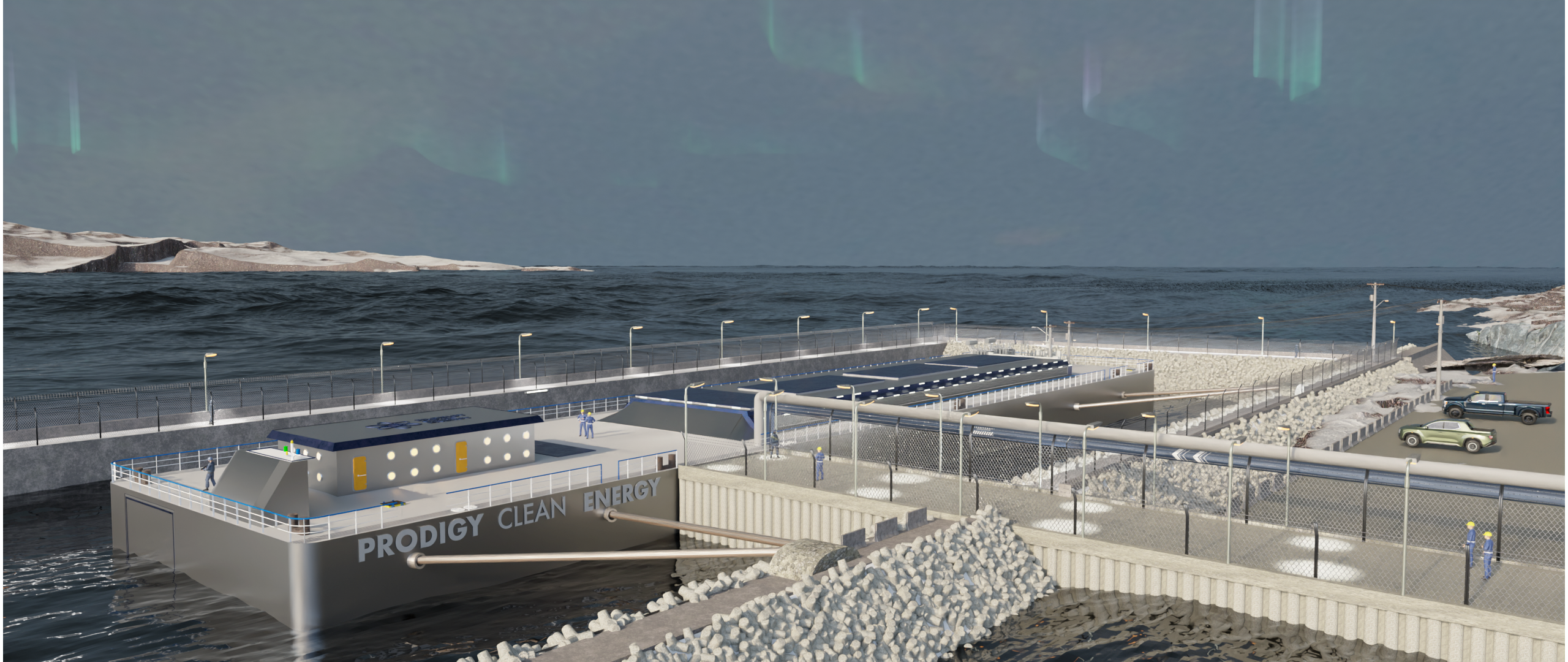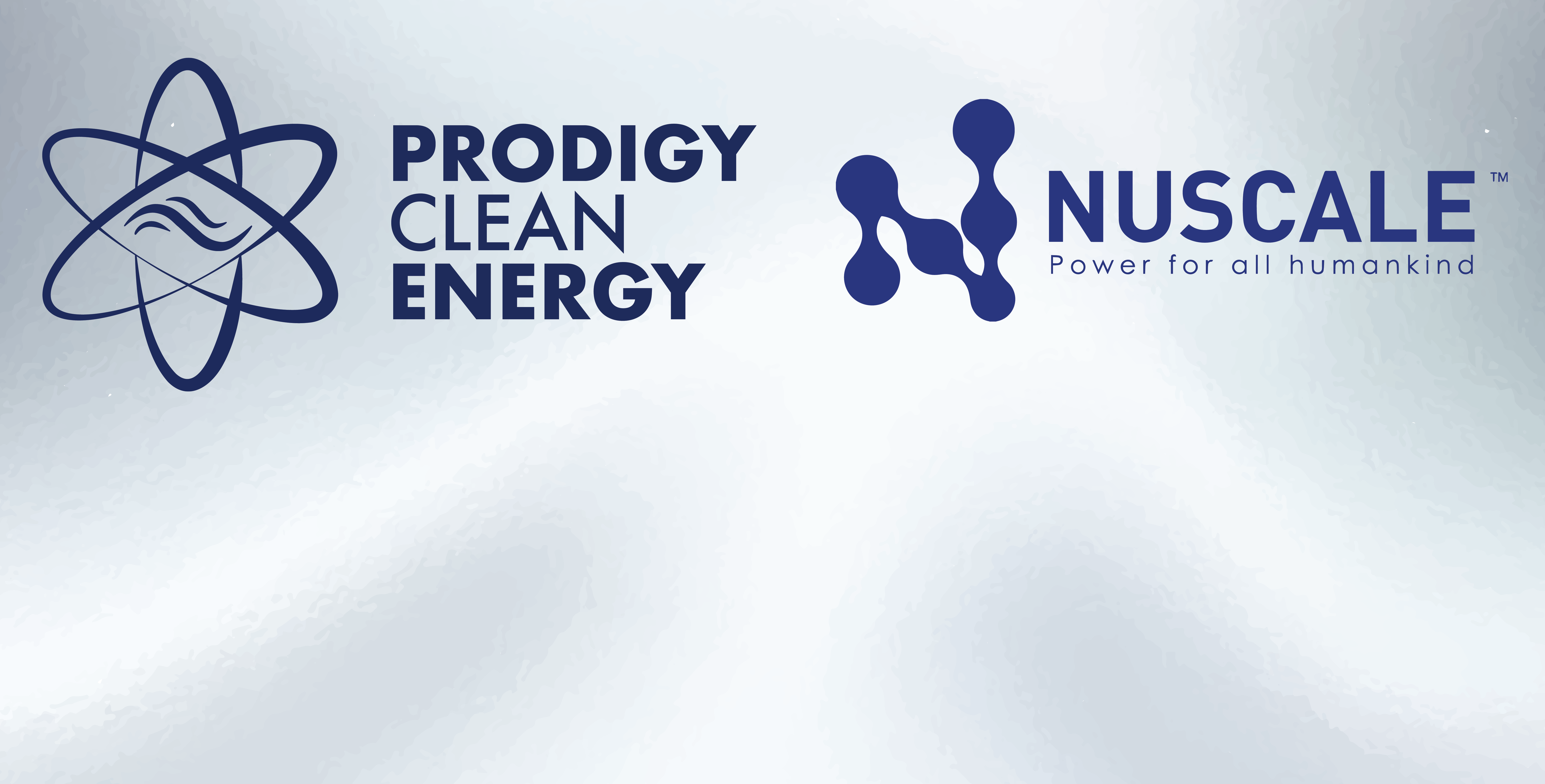
Today, Prodigy Clean Energy and Serco announced progress on a prototypical test program demonstrating the robustness of Prodigy’s Transportable Nuclear Power Plants (TNPPs) to resist accidental and threat scenarios. This first-of-its-kind effort is generating critical data needed to support licensing and public engagement, as Prodigy prepares TNPPs to enter commercialization by 2030.

Today, Prodigy Clean Energy and Serco announced progress on a prototypical test program demonstrating the robustness of Prodigy’s Transportable Nuclear Power Plants (TNPPs) to resist accidental and threat scenarios. This first-of-its-kind effort is generating critical data needed to support licensing and public engagement, as Prodigy prepares TNPPs to enter commercialization by 2030.

Today at CERAWeek, Prodigy Clean Energy and Lloyd’s Register announce teaming up on Transportable Nuclear Power Plants (TNPPs) with Government of Canada investment. The joint effort will produce requirements to start power plant fabrication by late 2020s.

Today at CERAWeek, Prodigy Clean Energy and Lloyd’s Register announce teaming up on Transportable Nuclear Power Plants (TNPPs) with Government of Canada investment. The joint effort will produce requirements to start power plant fabrication by late 2020s.

Prodigy regulatory leadership presented at the conference, speaking to the company’s progress to demonstrate readiness of its Transportable Nuclear Power Plant (TNPP) technologies for first new build project construction starting in 2030.

Prodigy regulatory leadership presented at the conference, speaking to the company’s progress to demonstrate readiness of its Transportable Nuclear Power Plant (TNPP) technologies for first new build project construction starting in 2030.

Federico Puente Espel, VP of Strategy and Technology Integration at Prodigy Clean Energy, had the honor of presenting at the IAEA 22nd INPRO Dialogue Forum on Successful Development and Sustainable Deployment of SMRs, and showcased Prodigy’s approach for Transportable Nuclear Power Plants (TNPPs) that will enable sustainable deployment of Small Modular Reactors (SMRs) in marine accessible regions where building an SMR using more traditional construction practices, even with modules, would be too challenging or expensive.

Federico Puente Espel, VP of Strategy and Technology Integration at Prodigy Clean Energy, had the honor of presenting at the IAEA 22nd INPRO Dialogue Forum on Successful Development and Sustainable Deployment of SMRs, and showcased Prodigy’s approach for Transportable Nuclear Power Plants (TNPPs) that will enable sustainable deployment of Small Modular Reactors (SMRs) in marine accessible regions where building an SMR using more traditional construction practices, even with modules, would be too challenging or expensive.

Prodigy markets its product as an alternative to diesel-fired power plants, which power nearly all Northern remote communities. Diesel is unpopular because of its high emissions and the considerable logistical challenges and costs associated with shipping it to far-flung places. Prodigy’s message dovetails with broader marketing efforts by the federal government and the nuclear industry to promote SMRs: The word “Indigenous” appeared in the government’s 80-page “SMR road map” more than 100 times, mostly in relation to how communities should be engaged with well in advance of specific project proposals. Yet tangible details on how nuclear technology might be deployed for the benefit of Indigenous peoples were almost entirely absent. With Prodigy’s Transportable Power Plant, a more coherent vision is beginning to emerge.

Prodigy markets its product as an alternative to diesel-fired power plants, which power nearly all Northern remote communities. Diesel is unpopular because of its high emissions and the considerable logistical challenges and costs associated with shipping it to far-flung places. Prodigy’s message dovetails with broader marketing efforts by the federal government and the nuclear industry to promote SMRs: The word “Indigenous” appeared in the government’s 80-page “SMR road map” more than 100 times, mostly in relation to how communities should be engaged with well in advance of specific project proposals. Yet tangible details on how nuclear technology might be deployed for the benefit of Indigenous peoples were almost entirely absent. With Prodigy’s Transportable Power Plant, a more coherent vision is beginning to emerge.

MONTREAL, CANADA – Today, in a major step toward Indigenous Economic Reconciliation, Prodigy Clean Energy and Des Nëdhé Group announce a Memorandum of Understanding to develop opportunities to power remote mines and communities in Canada utilizing Prodigy microreactor Transportable Nuclear Power Plants (TNPPs). Under the MOU, Prodigy and Des Nëdhé will explore potential TNPP projects, and engage with First Nations, Inuit, and Métis across Canada, identifying ways in which Indigenous Peoples could have ownership in TNPP new builds, and how an Indigenous workforce could take a leading role in TNPP commercialization and strategic infrastructure development.

MONTREAL, CANADA – Today, in a major step toward Indigenous Economic Reconciliation, Prodigy Clean Energy and Des Nëdhé Group announce a Memorandum of Understanding to develop opportunities to power remote mines and communities in Canada utilizing Prodigy microreactor Transportable Nuclear Power Plants (TNPPs). Under the MOU, Prodigy and Des Nëdhé will explore potential TNPP projects, and engage with First Nations, Inuit, and Métis across Canada, identifying ways in which Indigenous Peoples could have ownership in TNPP new builds, and how an Indigenous workforce could take a leading role in TNPP commercialization and strategic infrastructure development.

This first step in partnership with Des Nëdhé, an Indigenous Economic Development Corporation, underscores Prodigy’s commitment to Economic Reconciliation and a desire to find solutions to meet the North’s largest challenges. As an environmentally sustainable, reliable and cost-effective alternative to diesel, Prodigy microreactor TNPPs will unlock new possibilities for Northern communities and industry.

This first step in partnership with Des Nëdhé, an Indigenous Economic Development Corporation, underscores Prodigy’s commitment to Economic Reconciliation and a desire to find solutions to meet the North’s largest challenges. As an environmentally sustainable, reliable and cost-effective alternative to diesel, Prodigy microreactor TNPPs will unlock new possibilities for Northern communities and industry.

TORONTO, CANADA – Earlier this month on March 6, 2024, at PDAC, Deloitte and the OECD Nuclear Energy Agency convened an international group of government and industry stakeholders to discuss The Role of Small Modular Reactors to Decarbonize the Mining Sector. This exclusive event featured talks from leaders in nuclear, mining, and strategic infrastructure financing. Discussions focused on the mining end-use opportunity for SMRs, suitability of different reactor concepts, and the financial and regulatory pathways to a first-of-a-kind project.

TORONTO, CANADA – Earlier this month on March 6, 2024, at PDAC, Deloitte and the OECD Nuclear Energy Agency convened an international group of government and industry stakeholders to discuss The Role of Small Modular Reactors to Decarbonize the Mining Sector. This exclusive event featured talks from leaders in nuclear, mining, and strategic infrastructure financing. Discussions focused on the mining end-use opportunity for SMRs, suitability of different reactor concepts, and the financial and regulatory pathways to a first-of-a-kind project.

Toronto, Canada – Today, as we approach the close of PDAC, the world’s premier mineral exploration and mining convention, Kinectrics, a global provider of nuclear lifecycle services, and Prodigy, a Canadian developer of marine- and land- based Transportable Nuclear Power Plants (TNPPs), announce a partnership to accelerate commercialization of Prodigy TNPPs. These key enabling technologies will help to standardize nuclear deployment practices, bringing SMRs online faster and at a lower cost, including to power remote mines.

Toronto, Canada – Today, as we approach the close of PDAC, the world’s premier mineral exploration and mining convention, Kinectrics, a global provider of nuclear lifecycle services, and Prodigy, a Canadian developer of marine- and land- based Transportable Nuclear Power Plants (TNPPs), announce a partnership to accelerate commercialization of Prodigy TNPPs. These key enabling technologies will help to standardize nuclear deployment practices, bringing SMRs online faster and at a lower cost, including to power remote mines.

VIENNA, AUSTRIA -- Earlier this month from February 6-9, 2024, Marcel Devos, VP of Innovation and Regulatory Affairs at Prodigy Clean Energy, had the honor of serving as Chair for the International Atomic Energy Agency (IAEA) Technical Meeting: Considerations to Facilitate the Accelerated Deployment of Small Modular Reactors.

VIENNA, AUSTRIA -- Earlier this month from February 6-9, 2024, Marcel Devos, VP of Innovation and Regulatory Affairs at Prodigy Clean Energy, had the honor of serving as Chair for the International Atomic Energy Agency (IAEA) Technical Meeting: Considerations to Facilitate the Accelerated Deployment of Small Modular Reactors.

Westinghouse has revealed it is designing a transportable nuclear power plant (TNPP) featuring an eVinci microreactor with Canadian firm Prodigy Clean Energy, aiming to deliver a first project in Canada by 2030. The project will potentially integrate a single or multiple 5-MWe eVinci microreactors within a Prodigy Microreactor Power Station—a purpose-designed floating facility that will likely be deployed at a shoreline.

Westinghouse has revealed it is designing a transportable nuclear power plant (TNPP) featuring an eVinci microreactor with Canadian firm Prodigy Clean Energy, aiming to deliver a first project in Canada by 2030. The project will potentially integrate a single or multiple 5-MWe eVinci microreactors within a Prodigy Microreactor Power Station—a purpose-designed floating facility that will likely be deployed at a shoreline.

Westinghouse is Supporting the Next Cool Thing in Nuclear. Imagine a remote outpost in an arctic region, the Northern Lights fluttering in the distant night sky, and important work taking place in and around the facility. Currently, the most likely way this laboratory or industrial operation or military base can be powered and heated is through transported diesel fuel—both expensive and polluting, or a grid-based coal-fired plant if nearer a coastal region, also polluting. Westinghouse and Prodigy are designing a solution for the constant demands for electricity and heat in these types of harsh, remote climates: a Transportable Nuclear Power Plant (TNPP) featuring an eVinci™ microreactor from Westinghouse.

Westinghouse is Supporting the Next Cool Thing in Nuclear. Imagine a remote outpost in an arctic region, the Northern Lights fluttering in the distant night sky, and important work taking place in and around the facility. Currently, the most likely way this laboratory or industrial operation or military base can be powered and heated is through transported diesel fuel—both expensive and polluting, or a grid-based coal-fired plant if nearer a coastal region, also polluting. Westinghouse and Prodigy are designing a solution for the constant demands for electricity and heat in these types of harsh, remote climates: a Transportable Nuclear Power Plant (TNPP) featuring an eVinci™ microreactor from Westinghouse.

On November 14, 2023 in Vienna, Prodigy President and CEO Mathias Trojer presented to an audience of regulators, utilities, shipbuilders, SMR technology developers, governments, and other member state representatives, at the International Atomic Energy Agency’s (IAEA’s) first International Symposium on Floating Nuclear Power Plants (FNPPs). The event was eagerly anticipated by attendees who represented different elements of a rapidly growing global interest in the development and deployment of marine-based Small Modular Reactor (SMR) power plants. At the IAEA Symposium, presentations featured FNPP front-runners worldwide, and spoke to the benefits of these technologies to enhance the contribution of nuclear energy toward achieving global net zero targets.

On November 14, 2023 in Vienna, Prodigy President and CEO Mathias Trojer presented to an audience of regulators, utilities, shipbuilders, SMR technology developers, governments, and other member state representatives, at the International Atomic Energy Agency’s (IAEA’s) first International Symposium on Floating Nuclear Power Plants (FNPPs). The event was eagerly anticipated by attendees who represented different elements of a rapidly growing global interest in the development and deployment of marine-based Small Modular Reactor (SMR) power plants. At the IAEA Symposium, presentations featured FNPP front-runners worldwide, and spoke to the benefits of these technologies to enhance the contribution of nuclear energy toward achieving global net zero targets.

The two companies have now announced the conceptual design for the transportable and sea-based small modular reactor (SMR) which "can generate safe, affordable, and reliable electricity at grid-scale at any coastal location worldwide" with the design to be used "for engagement with utilities, regulators and shipyard manufacturers".

The two companies have now announced the conceptual design for the transportable and sea-based small modular reactor (SMR) which "can generate safe, affordable, and reliable electricity at grid-scale at any coastal location worldwide" with the design to be used "for engagement with utilities, regulators and shipyard manufacturers".

NuScale Power announced today that it has signed a Memorandum of Understanding (MOU) with Prodigy Clean Energy Ltd. and Kinectrics Incorporated to explore and inform the development of a regulatory framework to address licensing and deployment of a Prodigy Marine Power Station (MPS).

NuScale Power announced today that it has signed a Memorandum of Understanding (MOU) with Prodigy Clean Energy Ltd. and Kinectrics Incorporated to explore and inform the development of a regulatory framework to address licensing and deployment of a Prodigy Marine Power Station (MPS).

NuScale Power and Prodigy Clean Energy agree to work together to advance their technologies as a baseload clean energy solution for coastal locations and island nations

NuScale Power and Prodigy Clean Energy agree to work together to advance their technologies as a baseload clean energy solution for coastal locations and island nations